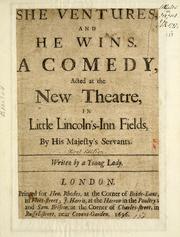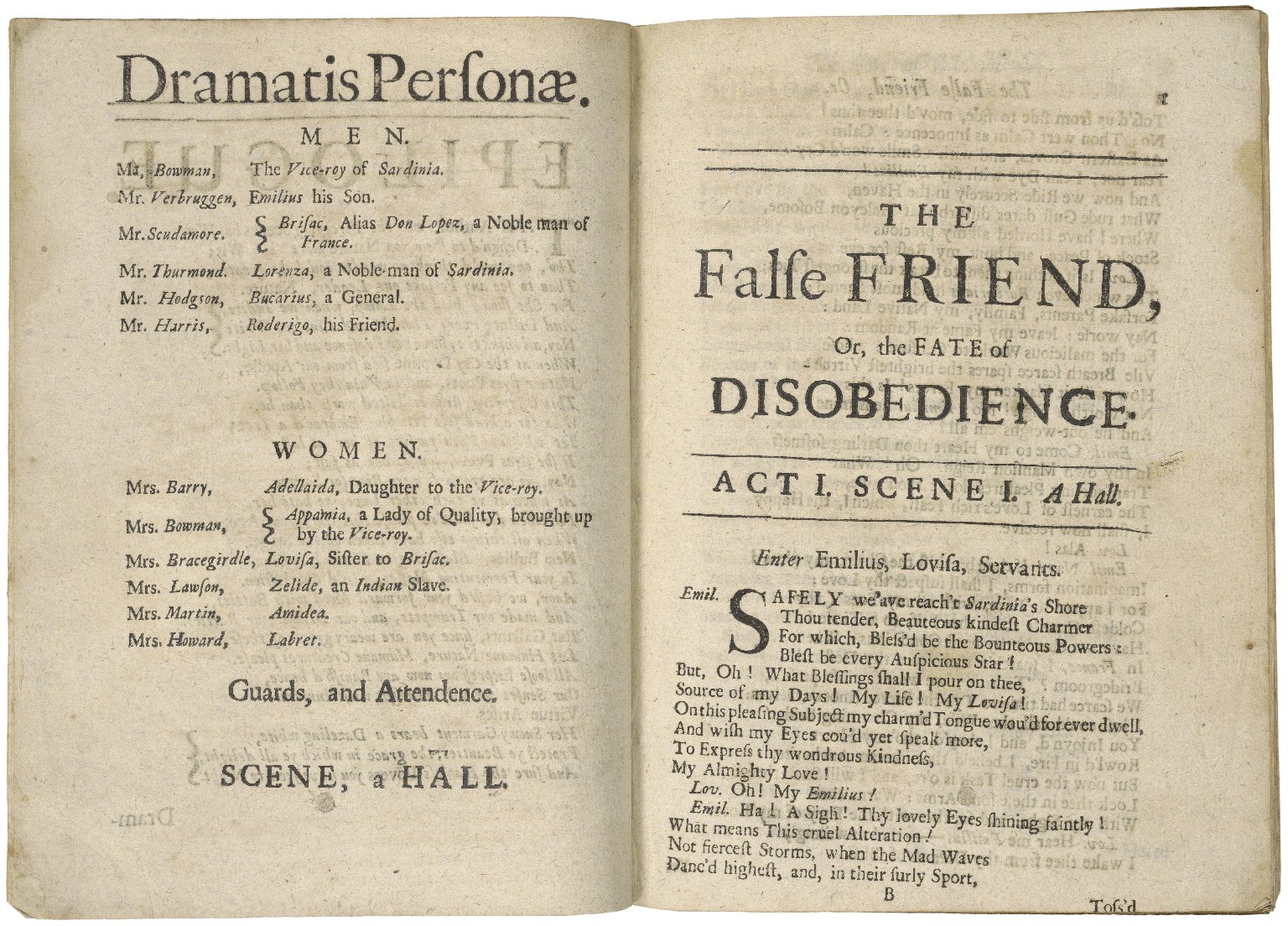|
Ariadne (writer)
Ariadne was the pseudonym of a "Young Lady" who wrote the play ''She Ventures and He Wins'', which was first performed at The New Theatre in its 1694-95 season. Little is known of her, however she was likely a novice writer who was "keenly aware of theatrical conventions and the politics of the theater". In the preface to her play, Ariadne says that she is not "altogether unacquainted with the Stage". Then, in her prologue, she attacks the owners of a rival theatre, saying that they "out of spite / Trump'd up a Play upon us in a Night", suggesting that she was at least some way involved with the theatre world of 17th century London. The play was a failure, closing after just two nights. It was, however, the first play written by a woman to be performed in London for 20 years, with the exception of works by Aphra Behn who had died six years before its production. Ariadne praises Behn in both the Preface and in the Prologue. Despite its failure on the stage, the play went on to be pu ... [...More Info...] [...Related Items...] OR: [Wikipedia] [Google] [Baidu] |
She Ventures And He Wins Cover
She most commonly refers to: *She (pronoun), the third person singular, feminine, nominative case pronoun in modern English. She or S.H.E. may also refer to: Literature and films *'' She: A History of Adventure'', an 1887 novel by H. Rider Haggard, and its film adaptations: ** ''She'' (1911 film), a silent short film featuring Marguerite Snow ** ''She'' (1916 film), a silent film produced in the UK ** ''She'' (1917 film), a silent film starring Valeska Suratt ** ''She'' (1925 film), a silent film starring Betty Blythe ** ''She'' (1935 film), featuring Helen Gahagan ** ''She'' (1965 film), starring Ursula Andress ** ''She'' (1984 film), starring Sandahl Bergman **''She'' (2001 film), with Ophélie Winter * ''She'' (1954 film), a West German comedy film directed by Rolf Thiele * ''She'' (1967 film), an Australian TV play ballet * ''She'' (magazine), British monthly magazine, 1955–2011 * ''She'' (Netflix series), Indian crime drama, 2020 * ''She'' (2015 film), an Indian Bengali fil ... [...More Info...] [...Related Items...] OR: [Wikipedia] [Google] [Baidu] |
She Ventures And He Wins
''She Ventures and He Wins'' (1696) is a comedy in five acts written by a "Young Lady" under the pseudonym of "Ariadne". The author, who is referred to by most documents and historians by her pseudonym, caused an uproar between the theaters of the area. Ariadne is noted as writing with humor and wit that matches that of her contemporaries. The original manuscript mentioned it was an adaptation of a "small novel", which has since been discovered to be ''The Fair Extravagant'' by Alexander Oldys, an unknown story that had been almost unheard of since its publication. Much of the plot remains the same with detail, some plot points, and characters changed. The main character in the Oldys text's name is Ariadne. Summary ''She Ventures and He Wins'' tells the story of two women who are tired of the old ways of dealing with the affairs of the heart. Charlotte, Juliana and Urania devise their own plans. Charlotte and Juliana dresses as a man in order to go into the world to find her perf ... [...More Info...] [...Related Items...] OR: [Wikipedia] [Google] [Baidu] |
Aphra Behn
Aphra Behn (; bapt. 14 December 1640 – 16 April 1689) was an English playwright, poet, prose writer and translator from the Restoration era. As one of the first English women to earn her living by her writing, she broke cultural barriers and served as a literary role model for later generations of women authors. Rising from obscurity, she came to the notice of Charles II, who employed her as a spy in Antwerp. Upon her return to London and a probable brief stay in debtors' prison, she began writing for the stage. She belonged to a coterie of poets and famous libertines such as John Wilmot, Lord Rochester. Behn wrote under the pastoral pseudonym Astrea. During the turbulent political times of the Exclusion Crisis, she wrote an epilogue and prologue that brought her into legal trouble; she thereafter devoted most of her writing to prose genres and translations. A staunch supporter of the Stuart line, she declined an invitation from Bishop Burnet to write a welcoming p ... [...More Info...] [...Related Items...] OR: [Wikipedia] [Google] [Baidu] |
Mary Pix
Mary Pix (1666 – 17 May 1709) was an English novelist and playwright. As an admirer of Aphra Behn and colleague of Susanna Centlivre, Pix has been called "a link between women writers of the Restoration and Augustan periods". Early years Mary Griffith Pix was born in 1666, the daughter of a rector, musician and Headmaster of the Royal Latin School, Buckingham, Buckinghamshire; her father, Roger Griffith, died when she was very young, but Mary and her mother continued to live in the schoolhouse after his death. She was courted by her father's successor Thomas Dalby, but he left with the outbreak of smallpox in town, just one year after the mysterious fire that burned the schoolhouse. Rumour had it that Mary and Dalby had been making love rather energetically and overturned a candle which set fire to the bedroom. In 1684, at the age of 18, Mary Griffith married George Pix (a merchant tailor from Hawkhurst, Kent). The couple moved to his country estate in Kent. Her first son, ... [...More Info...] [...Related Items...] OR: [Wikipedia] [Google] [Baidu] |
17th-century English Writers
The 17th century lasted from January 1, 1601 ( MDCI), to December 31, 1700 ( MDCC). It falls into the early modern period of Europe and in that continent (whose impact on the world was increasing) was characterized by the Baroque cultural movement, the latter part of the Spanish Golden Age, the Dutch Golden Age, the French ''Grand Siècle'' dominated by Louis XIV, the Scientific Revolution, the world's first public company and megacorporation known as the Dutch East India Company, and according to some historians, the General Crisis. From the mid-17th century, European politics were increasingly dominated by the Kingdom of France of Louis XIV, where royal power was solidified domestically in the civil war of the Fronde. The semi-feudal territorial French nobility was weakened and subjugated to the power of an absolute monarchy through the reinvention of the Palace of Versailles from a hunting lodge to a gilded prison, in which a greatly expanded royal court could be more easily k ... [...More Info...] [...Related Items...] OR: [Wikipedia] [Google] [Baidu] |
17th-century English Women Writers
The 17th century lasted from January 1, 1601 ( MDCI), to December 31, 1700 ( MDCC). It falls into the early modern period of Europe and in that continent (whose impact on the world was increasing) was characterized by the Baroque cultural movement, the latter part of the Spanish Golden Age, the Dutch Golden Age, the French ''Grand Siècle'' dominated by Louis XIV, the Scientific Revolution, the world's first public company and megacorporation known as the Dutch East India Company, and according to some historians, the General Crisis. From the mid-17th century, European politics were increasingly dominated by the Kingdom of France of Louis XIV, where royal power was solidified domestically in the civil war of the Fronde. The semi-feudal territorial French nobility was weakened and subjugated to the power of an absolute monarchy through the reinvention of the Palace of Versailles from a hunting lodge to a gilded prison, in which a greatly expanded royal court could be more easily ... [...More Info...] [...Related Items...] OR: [Wikipedia] [Google] [Baidu] |
17th-century Pseudonymous Writers
The 17th century lasted from January 1, 1601 ( MDCI), to December 31, 1700 ( MDCC). It falls into the early modern period of Europe and in that continent (whose impact on the world was increasing) was characterized by the Baroque cultural movement, the latter part of the Spanish Golden Age, the Dutch Golden Age, the French ''Grand Siècle'' dominated by Louis XIV, the Scientific Revolution, the world's first public company and megacorporation known as the Dutch East India Company, and according to some historians, the General Crisis. From the mid-17th century, European politics were increasingly dominated by the Kingdom of France of Louis XIV, where royal power was solidified domestically in the civil war of the Fronde. The semi-feudal territorial French nobility was weakened and subjugated to the power of an absolute monarchy through the reinvention of the Palace of Versailles from a hunting lodge to a gilded prison, in which a greatly expanded royal court could be more easily k ... [...More Info...] [...Related Items...] OR: [Wikipedia] [Google] [Baidu] |





